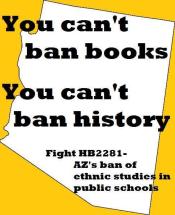ethnic studies effort
#WishiLearnedinHS Campaign Launches
in Solidarity with Ethnic Studies Educators and Students in Arizona
This hash-tag has been created in response to the Ethnic Studies ban in Arizona. It is designed to bring attention to the cultural gaps in our education; the gaps that widen as governments and school districts privilege some histories, while silencing other cultures and points of view. We turned to social media and asked people:
What do you wish you learned in high school as it relates to various cultural identities, histories, and perspectives?
On Feb 1, 2012 the government of Arizona’s ban on the teaching of Ethnic Studies in Tuscon, Arizona takes effect backed by HB2281. Under this law, school districts that do not comply are at risk of losing millions of dollars in state funding.

This means no more Mexican American Studies. Teaching ethnic students about their culture, history, race or oppression is dangerous because it can cause resentment between ethnic groups and build anger toward the government, says Arizona’s superintendent. This law has also resulted in the banning of books from Shakespeare and Paolo Freire to bell hooks.
In effect, HB2281 as a whole is designed to hinder political education and critical thinking.
As Arizona’s government moves forward to boldly protect a euro-centric education, we Americans across the country reflect on our own education. We recognize that Arizona’s law is part of a broader tradition that overlooks the accomplishments, perspectives and history of people of color, women and other marginalized groups.
Many of us have received an education that privileges the stories, ideas, history and perspectives of wealthy, western, white men. It is this tradition that creates a need for courses like Ethnic Studies, Mexican American Studies, Asian American Studies, African American Studies, Women’s Studies, Queer Studies, and many “others.” While we hope that Arizona and other states push to make classrooms and curricula truly inclusive, there is still a need to teach ALL students Ethnic Studies courses that take a more in-depth look at marginalized histories, literature, and perspectives.
What happens when people know and understand their own and other’s history and oppression? The State of Arizona may be afraid of the answer to that question. But we must consider this as we reflect on the gaps in our education. The expression “I wish I learned that in high school” has political implications.
This is very alarming that a state government would put forth and support such a piece of legislation. In a time when education is suffering, we should not be limiting the exposure of knowledge and materials. The learning and understanding of cultures, traditions, and peoples who follow them is very important for human development and interaction.
How are we to continue moving forward and expanding without an understanding of people and countries we deal with?
Also, check out: No History is Illegal: New website launched today with classroom lessons and pledge: http://zinnedproject.org/posts/16168
The ‘WishiLearnedinHS’ campaign is so exciting – a brilliant idea! It is the kids who will profit, with enriched curriculums and an education that addresses their experiences. Thank you! I’m going to think about what I want to post to FB.
Thank you so much for your encouraging words! And thank you for getting involved! We hope this campaign will help promote enriching curricula, in addition to calling out the gaps that many of us have experienced in our own education. Check out the Howard Zinn Project for some great curriculum: http://zinnedproject.org/posts/16168
Also the “No History is Illegal Campaign” offers downloadable curriculum on their website: http://www.teacheractivistgroups.org/tucson/
Just wanted to let you know how much I agree with your sentiments. So, much so in my wish to teach my daughter the true American History I wrote this book: Beads on a String-America’s Racially Intertwined Biographical History http://bit.ly/ReviewThis I have included the contributions of all races within its pages. If you get a chance check it out on Amazon http://amzn.to/BeadsUS in the meantime I will tweet and post your information.
Great! Thank you for taking on this important issue. We will post info about your book Beads on a String-America’s Racially Intertwined Biographical History on our twitter and Facebook. This campaign should not only point out the gaps but also curricula and resources such as yours. In Solidarity.
I think catering teachings to region is important as well. ie; The value of Cape Verdean contributions to society in New England…CV’s played a huge role in whaling and cranberry harvesting, but its never taught in class. I took a whaling class in middle school and CV whalers were never mentioned.
Fascinating and frustrating! Heather, we would love to hear more about this. Let us know if you decide to write about it.
Shame on the racist, biased, and narrow minded legislators in Arizona who supported this piece of legislative trash. They have taken revisionist history to a new low!
Pingback: What I wish I’d learned in High School | SPARK a Movement
Pingback: Philadelphia-based Feminist Media Activist Group Led By Providence Native, Nuala Cabral, Launches Campaign Supporting Ethnic Studies in Arizona
Pingback: The People Who Inspire Series: Nuala Cabral « Relando Thompkins, MSW
Pingback: A Fallen Leaf Production: Meet Us On The Sidewalk | Notes from an Aspiring Humanitarian (N.A.H.)
Pingback: From FAANMail: Women of Color Activists Target UMG, Clear Channel, Media Corporations